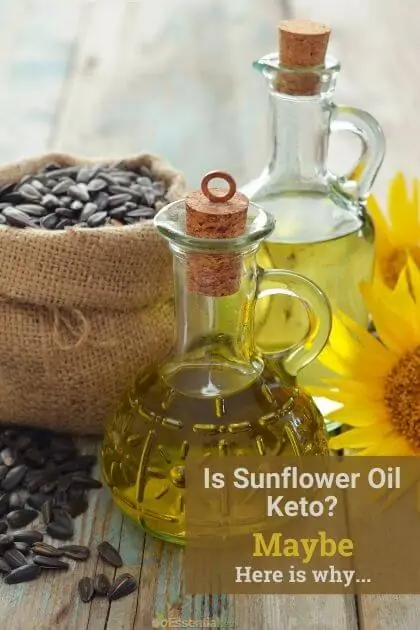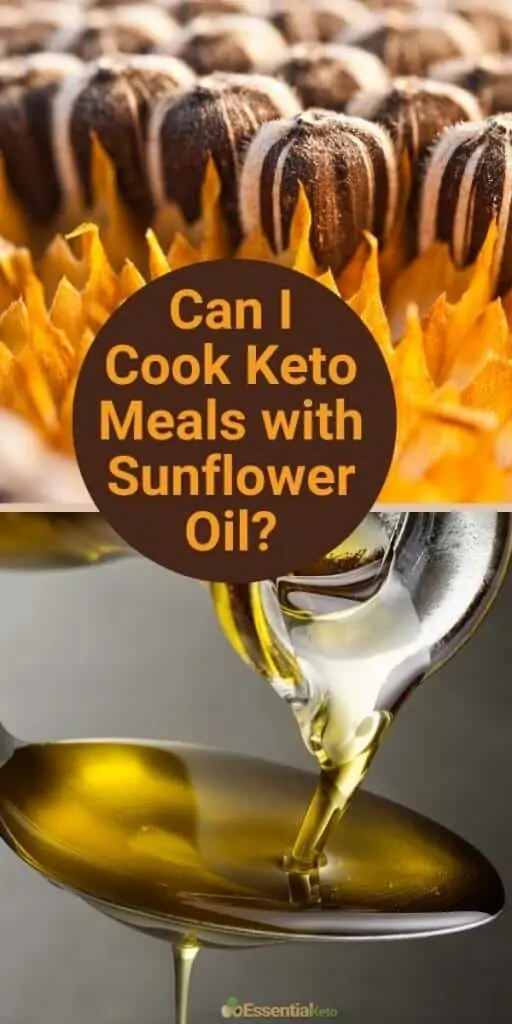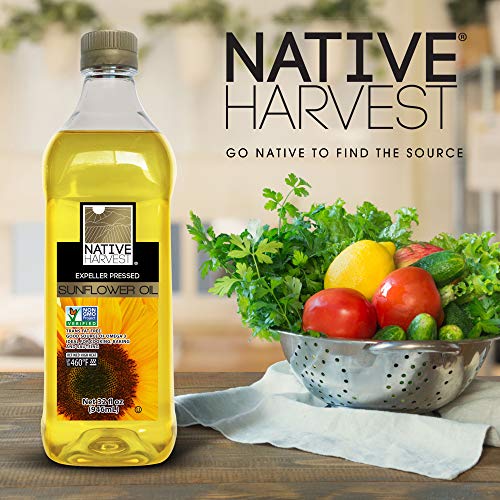Is Sunflower Oil Keto
Is sunflower oil keto?
Well,
You are starting a ketogenic diet, or you have been following a low carb high fat diet for a while and you are trying different cooking oils.
Or maybe you are experimenting with the best fat source to add to your crunchy salads.
And
Now you are asking whether you can cook with sunflower oil.
The…
Short Answer
Maybe!
Why?
The simple answer is that commercial oils are unhealthy as they are highly processed and are high in linoleic acid.
But cold-pressed sunflower oil that are high in oleic acid may be okay for keto.
There is no easy answer, so let's have a look at what sunflower oil is, how it is made, and the different elements that may make it keto or not keto-friendly.
What is Sunflower Oil?
As the name suggests, sunflower oil is made from sunflower seeds.
For this discussion we focus on two types of sunflower oil, the first is the regular oil that is generously stocked at your local supermarket.
The second is high-oleic sunflower oil.
The third which we will just touch on briefly is a hybrid between these two.
Before we can even consider whether it is healthy and or keto compliant, we must consider the composition of the available products.
So, let us start with what fatty acids we'll find in sunflower oil.
Composition
It is high in vitamins E and K.
But in deciding whether sunflower oil is good for keto, we want to look at the lipid profile - the fatty acid breakdown.
Sunflower oil consists of the following fatty acids.
Now, let's look at the breakdown of each of these fatty acids in regular and high-oleic sunflower oils...
Regular sunflower oils have high levels of linoleic acid (70% and more) and low levels of oleic acid 30% or less.
High-Oleic oil has a very low level of linoleic acid and high levels of oleic acid - 70% or more.
Medium range oils have oleic levels of around 60%.
Okay, so why does this matter?
High Linoleic Oil (Regular)
Around 70% of the fatty acids in sunflower oil is Omega 6. Most seeds and seed oils are packed with omega 6.
Even though omega 6 is an essential fatty acid that the body cannot manufacture, we already consume a lot of it and we don't want to consume too much of it.
Ideally, we want to consume both omega 3 and 6 daily but in a ratio of 1:1.
What about high-oleic sunflower oil?
High-Oleic Sunflower Oil
As you can see above, it is made up of only 4% linoleic acids and more than 80% oleic acid (omega 9).
There is substantially less omega 6 fatty acids and if our main decision about cooking with sunflower oil, is the level of omega 6, then yes this looks like a better oil for your ketogenic diet.
Click on the image to see them on Amazon. The product is also available in single bottles...
Mid-Range Oils
There are a whole range of oils with linoleic and oleic acids ratios in the middle of these.
This is an example of a mid-range product at Amazon...
Why are they Different?
Initially all sunflower oils were high in linoleic acid.
But based on a growing understanding of the health needs of the population, farming practices were adapted to increase the oleic acid composition of sunflower seeds.
So over time several varieties of sunflower seeds have been developed through standard plant breeding methods, to change the structure of the seeds.
It is claimed that none of these practices include genetic modification. For more information about these changes, read -
Genetic possibilities for altering sunflower oil quality to obtain novel oils
Progress in the genetic modification of sunflower oil quality
So, in conclusion the composition of the seeds has been changed over time to produce a healthier oil.
The next question would be how are these oils processed?
How is the Oil Produced?
The oil must be extracted from the seeds, ideally in a way that destroys as little as possible of the nutrients but also provide a decent shelf life.
There are three steps to obtain the oil from the seeds.
1 - Preparation
The seeds are cleaned with sieves and magnetic separation to remove impurities like stems, leaves, stones, and any other elements that should not be included in the seed oil.
2 - Extraction
Then the oil is extracted from the seeds.
It can be extracted with a cold-pressed process through expeller pressing.
Or a hot press process where extra heat is introduced to extract the oil.
Or a chemical process using chemical components.
3 - Refining
Once the oil has been extracted, it must be refined.
This can be naturally or include processes like degumming, neutralising, bleaching, deodorising and anti-oxidising. To understand this better read more here.
So
It is clear that if you are considering adding sunflower oil to your keto diet, you'll want to make sure it is a high-oleic oil and that has ideally been cold pressed with as little refinement as possible.
But
What do the macros look like?
Macros
The macros per 1 tablespoon (roughly ½ a fluid ounce or 15ml) -
The macros are very much the same whether you look at regular or high-oleic oil.
What is different is the different types of fatty acids as can be clearly seen in the USDA source documents and discussed above under composition.
Glycemic Index (GI)
Sunflower oil like most oils has no sugar and no carbs so it does not impact blood glucose levels.
However is discussed in our article - Is ghee keto friendly? - when you add a good keto-friendly fat to vegetables, it also improves the GI of your meal.

Reasons not to Consume it
As you've seen, as long as you choose a high oleic oil and not a high linoleic oil, you can add small quantities into your ketogenic diet.
But these are the reasons I prefer to stick to other fats:
Over Consumption of Omega 6
Most are high in linoleic acids/omega 6.
Changing in Seed Composition
All sunflower seeds used to be high in linoleic acids. So that is its natural form.
This was changed through farming practices. If this were my only option, I would be okay with this.
But
There are Healthier Alternatives
There are many other healthy fat options to cook with, to drizzle over your vegetables or to add to salads.
Here are a few...
Alternatives
My favorite fats for cooking are:
Animal Fats
I like to cook with animal fats like lard, tallow, and leftover fat. And, also with ghee.
These are my favorite for a few reasons.
They all have a high smoke point. They all consist mostly of saturated fat, so won't go rancid like vegetable oil.
Here we discuss the best ghee for keto.
You can render your own lard, but if you want to buy it, have a look at something like this...
If you want to cook with leftover grease, then invest in a good grease keeper like this one...
This also makes for a great gift for a keto friend.
And
If you are in the market for gifts, then check out our keto gift ideas.
If you prefer vegetable oils for cooking and for your salads, then these are some options...
Vegetable Fats
Good vegetable fat sources for cooking include - coconut, extra virgin olive, and avocado oils.
To add to salad dressings, my favorites are olive, avocado, and MCT oils.
This delicious Portuguese olive oil has the same fatty acid structure as a high-oleic sunflower oil.
Another beautiful gift idea.
After all this, if you do want to cook with sunflower oil, then keep the following in mind...
Buying Sunflower Oil
What to look out for?
This product is not bad, except that it is not certified organic...
Conclusion
In conclusion to the question - Is sunflower oil keto?
The answer is -
High-oleic sunflower oil is keto.
Regular high-linoleic sunflower oil is not keto.
But
Check how it was produced and refined and stick to cold-pressed oil.
And if you want to know about sunflower seeds, then check out this article.
Keto Stamp of Approval?
Only high-oleic sunflower oil is okay for keto.
And
There are better oils for cooking or to drizzle over salads that you may want to consider.
We Need Your Help
If you have a question about your favorite cooking oil, please leave a comment.
And







